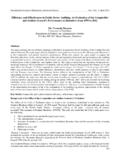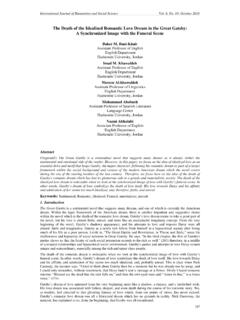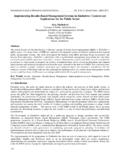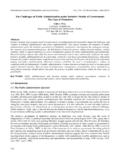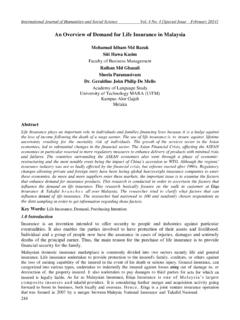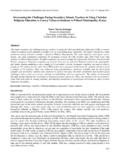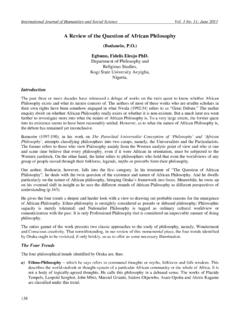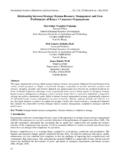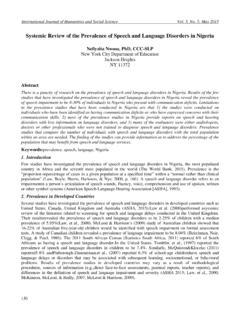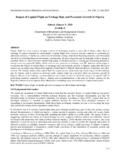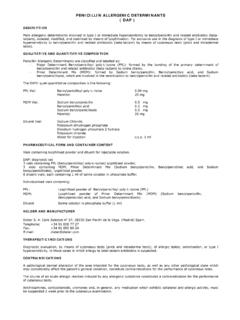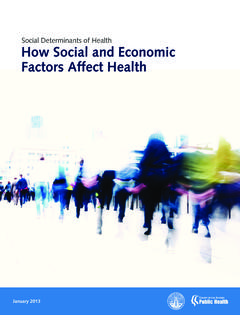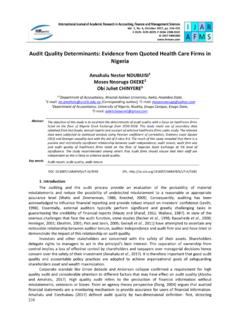Transcription of Determinants of Academic Staff Retention in Public ...
1 International Journal of Humanities and Social Science Vol. 2 No. 13; July 2012 205 Determinants of Academic Staff Retention in Public universities in Kenya: Empirical Review Jane Muceke Ng ethe1 Dr. Mike E. Iravo Prof. Namusonge Department of Entrepreneurship and Procurement Jomo Kenyatta University of Agriculture and Technology Box 62000-00200 Nairobi, Kenya. Abstract Employee Retention is one of the challenges facing many organizations both Public and private, occasioned by globalization that has intensified competition and increased mobility of highly skilled employees. Retention of Academic Staff is a pertinent issue in Pubic universities in Kenya yet these institutions are operating in a highly competitive environment and hence depend on these Staff for success and sustainability.
2 Indeed Retention of Academic Staff will help the universities accomplish their vision and mission and hence become centres of excellence. This study aims to review literature related to Academic Staff Retention with the aim of establishing gaps for further research. Key words. Determinants , Academic Staff Retention , Public universities in Kenya 1. Introduction The role of universities in the provision and development of manpower required for the social economic and technological advancement of any nation cannot be over- emphasized. By their unique nature universities are expected to be a repository of the most specialized and skilled intellectuals. They serve as storehouses of knowledge for nurturing the manpower needs of the nation and hence for satisfying the aspirations of the people for a good and humane society.
3 Central to the realization of University goals and objective are the Academic Staff whose roles are crucial and their number, quality and their effectiveness makes the difference in university education production function and to the wider society (Mwadiani, 2002). Pienaar (2008) strongly argues that the Academic profession is fundamental to the functioning of any university. Without well qualified and committed Academic Staff , no Academic institution can really ensure sustainability and quality over the long haul. Higher education institutions are therefore more dependent on the intellectual and creative abilities and commitment of the Academic Staff than most other organisations. This therefore makes it critically important to retain this cadre of Staff . Background of the Study The most valuable asset available to an organisation is its people, thus retaining Staff in their jobs is essential for any organisation.
4 Indeed there is a paradigm shift from human resource to human capital which consists of the knowledge, skills and abilities of the people employed in organization which is indicative of their value (Armstrong, 2009). When employees leave their jobs, it is often a sign that something is going wrong. According to Zhou et al, (2004) , the costs of Academic Staff turnover, such as subsequent recruiting expenses, disruptions of course offerings, discontinuities in departmental and student planning, and loss of student graduate advisors, are borne at individual, departmental and institutional levels and have an impact on quality of services and the image of the institution In addition, Pienaar et al (2008) note that Academic Staff turnover has several disadvantages such as costs related to decreased organizational loyalty, the loss of knowledge and experience regarding the institution, and the increase in time and cost in training novice academics.
5 Tettey (2006) argues that while individuals who move to other organizations may contribute to the specific activities of that organization, their departure from academia means that the synergies that come with a group of academics working together is diminished, and the impact and scope of knowledge production and dissemination is lessened. Centre for Promoting Ideas, USA 206 Despite the foregoing, Academic Staff Retention has been a pertinent issue in higher education institutions. Indeed the problem of Academic Staff Retention is a global one which affects both developing and industrialized countries. Yousaf (2010) observes that the difficulties of Academic Staff Retention within the industrialized countries are well documented.
6 In the United States, for example about of the full time Academic Staff left their institutions for other places within one Academic year from 1997 to 1998, of these only 29 were retirees, the remaining 71% left for variety of reasons. A year 2000 survey of full time faculty members in the US showed that more than 40% of them had contemplated changing careers (Sanderson et al, 2000). In Canada, it has been argued that one of the challenges that universities will face over the next decade or so is on Academic recruitment and Retention . Similarly it was suggested that in the early 21st century, there would be a crisis in Australian higher education with an estimated Academic labour shortage of 20,000 if the trend was not addressed (Mathews, 2003 cited in Tettey 2006). In a study carried out in Australian higher education institutions, 68% of the Academic personnel indicated that they wished to leave higher education (Sanderson et ,al, 2000).
7 The issue of Staff attrition and Retention of Academic Staff in developing countries has been less documented in the literature. This is because as Mihyo (2007) observes the issue tends to be subsumed under the general category of brain drain without particular attention being devoted to it. This sub-summation reflects the close relationship between the brain drain and Staff Retention in many countries. Indeed the triggers identified for the brain drain in general are identified to those behind Academic Staff attrition and thus the two processes are intertwined as many highly skilled immigrants tend to be current Academic or potential ones. In the African context, much of the expertise base of universities has been eroded to the extent that not enough teaching capacity is available to provide quality training for new generation of citizens.
8 Many institutions are negatively affected by the fact that some African students who are studying abroad or current faculty members who are sent abroad to pursue further education, do not return because of pull and push factors (Tettey, 2006). This problematic situation is evident in South African higher education institutions, since data indicates that a substantial number (between 5% and 18%) of academics leave higher education institutions (Pienaar et al, 2008). Osalusi et al (2010) observes that brain drain was a phenomenon that had afflicted the Nigerian University system most severely in the 1980 s through to the 21st century and that country had lost its experienced Academic to even smaller African countries such as Ghana and Rwanda and bigger countries such as Britain, America, France and Germany.
9 Locally, qualified Academic Staff have resigned from Kenyan Public universities and secured better paying jobs abroad (Waswa et al, 2008). Brain drain among the Academic Staff is real within the Public universities and this affects Staff Retention . Internal brain drain is also rampant with movement of highly skilled academics to other sectors in the country (GOK, 2006). There is a dearth of research on Retention of Academic Staff in the Kenyan context. yet it is important for Public universities in Kenya to know why Academic Staff stay in their organisations, since as Armstrong, (2009) observes, proper Retention strategies are based on the understanding of the factors that affect whether or not employees leave or stay. As noted by Kiamba (2005) Public universities in Kenya have commercialized most of their services and hence heavily rely on their Staff for quality services and product.
10 Naris et,al (2010) observes that every educational institution wants to have a competitive edge in order to attract more students and potential employees. It is through Retention of Academic Staff that they will be able to have competitive advantage by ensuring continuity in provision of quality services and products. This paper aims to review literature related to Academic Staff Retention in Kenyan Public universities with an aim of establishing gaps. 2. Theoretical review Various theories address employee needs and have been advanced by a number of authors as basis of Retention strategies in organizations. Most notable are; Equity theory (1965) Expectancy theory (1964); Hertzberg (1959) two factor theory and Human capital theory, all of which are all relevant to this study. Equity Theory Equity theory (1965) is concerned with the perceptions people have about how they are treated as compared with others.
